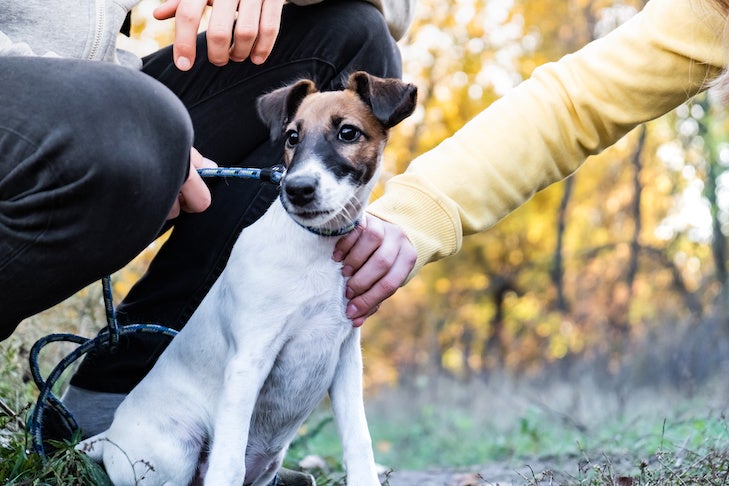During the COVID-19 lockdown, your puppy won the people lottery by enjoying your attention around the clock. Snuggling for hours on the couch, long neighborhood walks, and extra lunchtime treats were all in a day’s work. It’s a heavenly routine your canine best friend has come to rely on. The downside is that your pup missed out on experiencing what the rest of the world looks like. As life slowly transitions after the pandemic you may need to help your pup adjust to staying home alone and encountering new experiences outside the house
Figuring Out the New Normal
As people begin leaving the house and going back to the office, it’s goodbye to extra dog time and a set routine. In the meantime, your pup has no idea why you’re not available 24/7. Dogs are intuitive creatures. They feel their owners’ feelings and anticipate their every move, but when the schedule changes, they can feel perplexed. As a result, they may show signs of separation anxiety by barking too much, destroying household possessions, depression, and housetraining mistakes. To ease your puppy’s negative reactions, try these tips:
- Exercise or play games with your dog an hour before you leave the house.
- Keep departures and returns relaxed and low-key. Too much of an instant fuss only revs up your pup’s behavior.
- Arrange for a dog walker or doggy daycare visit. This gives your pup a positive outlet for his physical and mental well-being.
- Introduce puzzles and play new games. These activities provide enrichment.
- Try providing soothing blankets, bedding, or pheromone products. These may not work for every dog but may be worth trying. Note that some dogs may shred and eat their bedding under stress, which can be dangerous.
- Consider enrolling your dog in a puppy training or performance class. This provides mental and physical stimulation. Plus, the training helps!

Missed Socialization
Staying indoors or within the safe street boundaries also prevented many owners from introducing their new puppies to the community around them. As a result, many pups missed out on seeing new sights, hearing different sounds, and discovering a range of experiences to help them build their confidence and bond with their community.
Regardless of your puppy’s age, it’s not too late to begin the socialization process. Depending on your puppy’s comfort level it’s best to gradually introduce your pup to new experiences outdoors.
Rather than spending fewer, longer hours getting your pup out, schedule shorter, more frequent trips. Take treats on all socialization trips and reward for confidence.
Does the sound of a rumbling garbage truck driving by send your pup into a frightened frenzy? Will the sight of a fire hydrant on the sidewalk cause your dog to turn the other way? When a group of curious children crowd around your pup, does your puppy like it or want to run in the opposite direction?
Take It Slow
If so, resist the urge to flood your dog with too many new experiences all at once. The idea is to introduce your puppy to people and situations rather than overwhelm the dog.
For pups who have never met strangers or encountered odd sights in over a year, cramming too many stimuli in one visit can cause your dog to shut down and cause more harm than good.
If going out proves too much for your pup, invite one or two friends to visit with your dog in your yard. When it’s safe to do so, invite them indoors. A playdate with a friend and a stable dog might help, too.
Especially avoid dog parks, big crowds, or busy outdoor restaurants, as these too present unpredictable situations.
For puppies who appear comfortable with odd sounds, sights, and experiences, try branching out to larger, noisier circumstances.
“One great place to socialize a more stable puppy is big box hardware store,” says Cyndy Wood, CPDT-KA, a dog trainer in Burbank, California. “It’s a great place for a pup to inhale new aromas, see unique objects, and encounter different experiences. The garden center and lumber sections really fit the bill.”
Above all, keep socialization calm and positive. Treats, toys, and encouraging words, and petting help reinforce your pup’s positive reactions.
The AKC is here to help owners with questions and concerns about COVID-19 and dogs. Find answers to your questions, plus at-home activity ideas, training tips, educational resources, and more on our Coping With COVID-19 hub.

